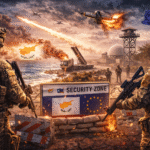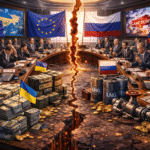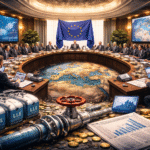Iran has confirmed it is working with France, Germany, and the United Kingdom to schedule a new round of nuclear talks, according to Iranian Foreign Minister Abbas Araqchi. This development may mark a significant step toward de-escalating tensions surrounding Iran’s nuclear programme following recent regional hostilities.
“We are working to set a date for the meeting with the Europeans,” Araqchi told local media, emphasizing that Tehran’s negotiating stance is now ‘stronger than before.’ He also confirmed recent communications with EU Foreign Policy Chief Kaja Kallas and his European counterparts, resulting in an agreement to hold the talks at the deputy foreign minister level.
Talks Follow Major Escalation with Israel and the U.S.
The announcement comes in the wake of a 12-day conflict involving Israel and the United States, during which key Iranian nuclear facilities were targeted in coordinated airstrikes. In response to these attacks, Iran halted cooperation with the UN’s International Atomic Energy Agency (IAEA), prompting inspectors to withdraw from the country.
The strikes, widely condemned in some international circles, reportedly caused severe damage to Iran’s nuclear infrastructure. Iranian President Masoud Pezeshkian stated earlier this month that the extent of destruction has left Iranian authorities unable to access or assess several of the affected facilities.
European Pressure and Snapback Sanctions
European countries have reportedly threatened to reinstate sanctions lifted under the 2015 Joint Comprehensive Plan of Action (JCPOA), invoking the “snapback” mechanism unless Iran agreed to return to the negotiating table. The resumption of dialogue appears aimed at preventing further escalation and potentially reviving key aspects of the nuclear agreement.
Conditional U.S. Engagement
While the United States is not currently included in this upcoming round of talks, Iran has signaled it may be open to future negotiations with Washington — but only under strict conditions. Araqchi recently told foreign diplomats in Tehran that Iran would agree to U.S. talks only if assurances are made that future dialogue would not lead to conflict.
“Iran has always been ready and will continue to be ready for nuclear discussions,” he said, “but assurance must be provided that talks will not result in war.”
Nuclear Concerns Remain
Iran continues to insist on its right to enrich uranium on its own territory, a demand strongly opposed by the United States. U.S. President Donald Trump has reiterated that such enrichment poses unacceptable risks. While Iranian enrichment has reached 60%, which is just a technical step away from the 90% weapons-grade level, international assessments, including those from the IAEA and U.S. intelligence agencies, indicate that Iran has not operated a formal nuclear weapons program since 2003.
Despite this, Israel has claimed that a nuclear bomb was within Tehran’s reach last month, which it cited as justification for its strikes.
As Iran and the European powers prepare to reconvene, the upcoming talks could offer a fragile but important opportunity for diplomatic engagement — and potentially pave the way for broader efforts to contain nuclear proliferation in the region.








